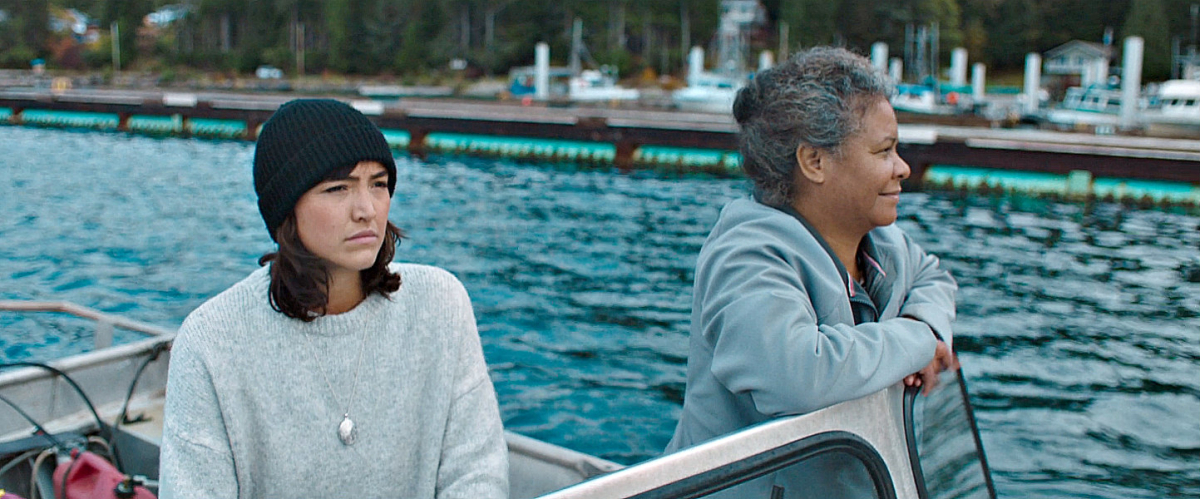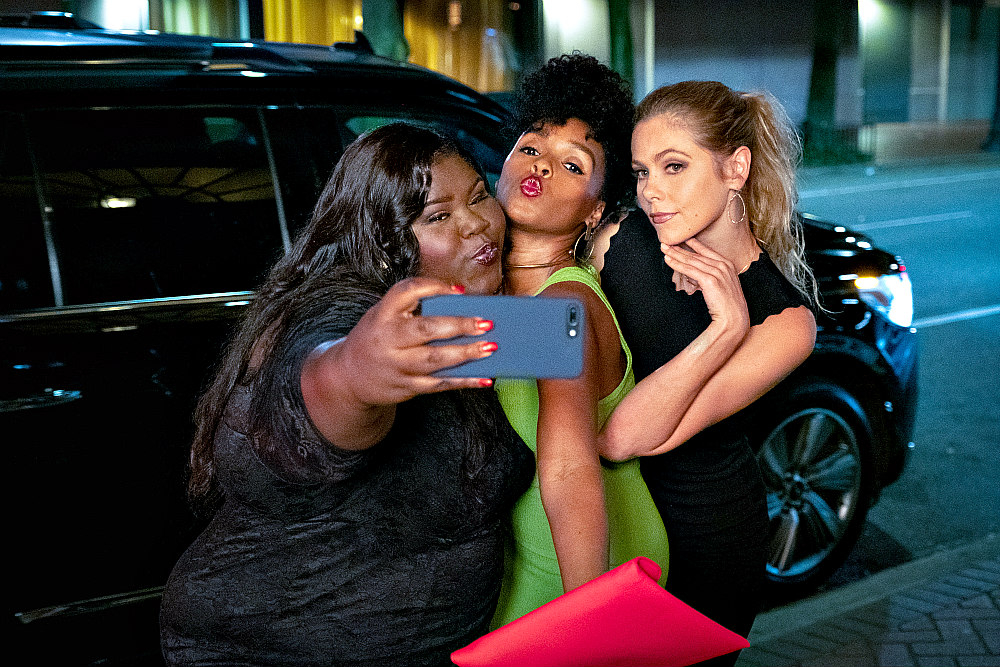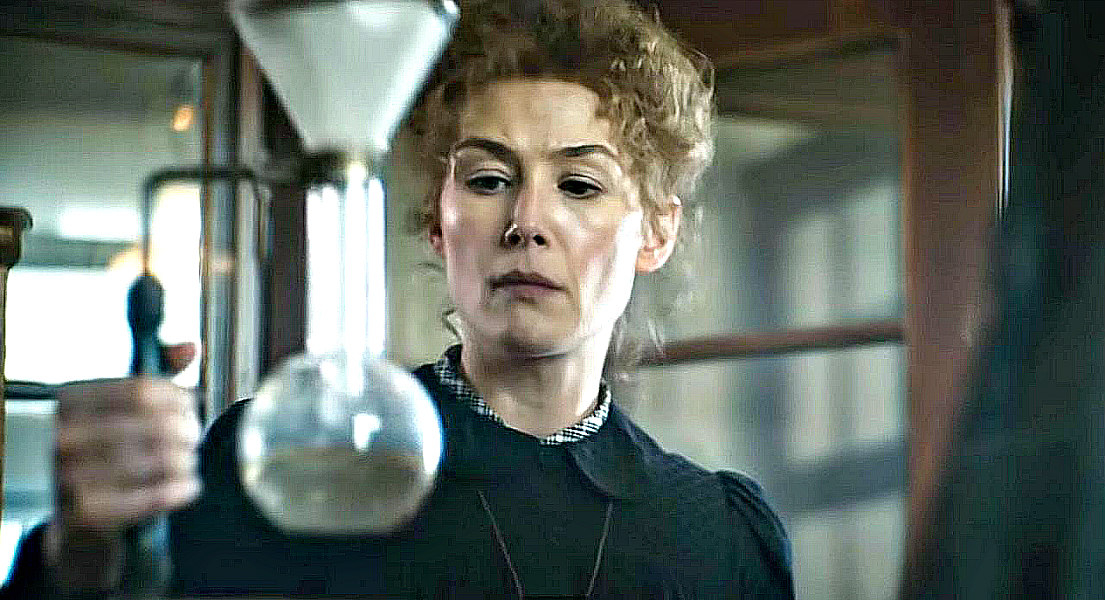The biggest-ever protest, a modern Southern Gothic, and an early VIFF review

It’s not too early to get up to speed for the Vancouver International Film Festival. Most of VIFF this year will be streaming, so learn how to view it on your computer, your TV or a hybrid of the two. Some films will also be in theatres. And a few films will only be in theatres. The schedule is now online.
Caution though. If you see a title already sold out, it may not mean that. It may be that terms of availability aren’t settled yet and no tickets have been sold at all. See why it’s good to check it out early? Best site I’ve come across is the tab called “2020 VIFF Connect Online Screenings” at https://viff.org/
I’ve got a review of the opening film today, plus many others not with the festival.
We Are Many: 4½ stars
The Devil All the Time: 3½
Monkey Beach: 3
H is for Happiness: 3
Blackbird: 2½
The Nest: 3
Antebellum: 2½
Radioactive: 2½
WE ARE MANY: Seventeen years ago, on Feb. 15, the largest protest event in human history took place. Millions of people in 600 cities around the globe marched against an impending war on Iraq. Pressure was building inexorably for one. This bristling film shows the efforts on both sides with remarkable detail. The march organizers recall their sense of urgency and both insiders and observers analyze the work of the hawks calling for war. Since it’s a British film, Tony Blair’s toadieness gets much attention. But Colin Powell’s lies to the United Nations are here, too, as are several clips of George W. Bush’s fake sincerity, including his “axis of evil" speech. David Frum, who wrote it for him, isn’t there, but a terrific bunch of others are, including Colin Powell’s former chief of staff, UN arms investigator at the time Hans Blix, author John le Carré, musician Brian Eno, actors Danny Glover, Susan Sarandon, and many more.

The film then tells how morale collapsed among the protesters. So many had marched and affected nothing. The war went ahead anyway. To this day, it’s not clear how many Iraqis died in it, but the film does say what we all know: It was based on lies and no good reason. Le Carré calls it “a crime of the century.” Remarkably the film ends on an up-note. The protest inspired other movements. This is an important film by Amir Amirani, a British documentarian who was also co-producer of the Iran history flick, Coupe 53, which played VIFF last year. This new film is coming to theatres next week, to VOD next year and to a special virtual streaming Monday on the International Day of Peace. (You can find details here: wearemany.com) 4½ out of 5
THE DEVIL ALL THE TIME: A former Spider-Man and a future Batman cross paths in this sprawling southern gothic and bring along enough perversity and piety to rivet all the sinners and the devout among us. Andrew Garfield plays a young man still hurting with the trauma of finding his father, a death by suicide, at the wooden cross he had set up in the woods to pray at. The dad had been traumatized himself by an incident in the South Pacific during the Second World War. The film flips around in three different decades to assemble this epic set in a small West Virginia town, a hamlet in southern Ohio, and on the road between.

Robert Pattinson is the new preacher in town with a mesmerizing raspy sermon style and a special interest in the teenage girls in his congregation. There’s also a pair of serial killers about (Jason Clarke and Riley Keough) who prey on hitchhikers by luring them with offers of sex. She’s the sister of the town’s sheriff and therefore never suspected. In a separate incident, Mia Wasikowska is stabbed to death with a screwdriver by a character who equates death and God. It’s almost too much to watch this much brutality and corruption amassed in one place, but it fits a long literary tradition in the American South and with both star quality and fine acting is most engrossing on screen. Donald Ray Pollock, who wrote the novel, leads us through it with voiceover narrator with a drawl, while superb art direction and music choices ranging from mountain folk songs to country and other oldies create the ambience. The meaning of it all is elusive, but the film is more than watchable. (Netflix) 3½ out of 5
MONKEY BEACH: The opening film at VIFF this year is an almost completely B.C.-grown product. It’s filmed in Haisla territory up coast, involves Haisla mythology and culture and comes from a novel by Eden Robinson who lives up there. The director, Loretta Todd, is a Métis Cree born in Alberta, but has worked a lot in documentaries around here and has done a respectful job of transferring the novel to the screen. She lets it get off to a slow start, though, with a certain vagueness until the story really takes hold.

A young Indigenous woman (Lisa Hill played by Grace Dove) has had visions for years of her brother’s death. The novel starts with a phone call telling her he’s lost at sea. The film takes some time before she hears that, rushes home from Vancouver to Kitamaat and sets out to find him. There are dark creatures in the woods, a supernatural aura and the weight of the demands she feels to work with and not deny her mystical side. That’s hard to tell in a movie; We’re not used to what Todd calls elliptical storytelling based on association rather than a linear narrative. I can’t say that I got it all, but I did get the journey she was on. Tina Lameman gives encouragement as her grandmother and Adam Beach as her impish uncle is a more contemporary voice. Ultimately, this is a potent story of cultural survival. (It starts streaming Thursday by VIFF CONNECT, but also gets one free screening in theatres around B.C., VanCity, the Rio and Cinematheque in Vancouver, Kay Meek Centre in West Vancouver, CineCenta in Victoria, Imagine Whistler Village 8, Civic Theatre in Nelson, Kamloops Film Society, Classic Salmon Arm and Tillicum Twin Theatres in Terrace.) 3 out of 5
H IS FOR HAPPINESS: How about a cheerful quirky film to offset the gloom out there? This one is from Australia and you can watch it with the whole family. Maybe not with the very young or the older teens, but anybody else who can take a bit of optimism mixed with silliness. It has won awards both in its home country and at the Berlin Film Festival and comes from a popular novel by Barry Jonsberg called My Life as an Alphabet.

Daisy Axon, a red-haired and much-freckled girl I’ve never seen before, is delightful as 12-year old Candice Phee. She’s a brown-noser at school and eternally sunny, even though her home life is dull with a deeply depressed mom and a distant dad, who is also estranged from his brother and his former business partner known as Rich Uncle Brian. A new kid in class (Wesley Patten) who calls himself “Douglas Benson from another dimension” becomes her friend and inspires her. How can she fix her family? It is fun, funny and heartwarming. There’s a good dose of that irreverent and ironic Australian humour to divert it from getting mawkish. Well-known actors like Miriam Margolyes and Richard Roxburgh are in the cast directed by John Sheedy, who has done a lot of TV and stage work before this debut feature. The denouement is a hoot. (Video on demand) 3 out of 5
BLACKBIRD: Good actors doing good work and even then this is an uncomfortable film to watch. Especially if you know somebody who has been involved a similar drama. I do. The subject is assisted suicide. Susan Sarandon plays a woman who wants to die while she still has her dignity. She has a terminal illness and fears the prospect of having to be fed through a tube. Sam Neill plays her doctor husband who will give her a drug in a glass. They’ve invited family and others over for an early Christmas celebration the day before it is to happen.

The guests are played by a great cast: Kate Winslet and Mia Wasikowska as her daughters, Lindsay Duncan as her best friend and Rainn Wilson, Bex Taylor-Klaus and Anson Boon as relatives of some of them. Old times are recalled and a few secrets are spilled. Boon’s character, for instance, hasn’t told his parents he wants to be an actor. Mia’s spent time in a psychiatric hospital and berates her dad. When the mood isn’t volatile like that, it’s at least awkward. Until a bizarre plot twist arrives. It could have made a story all on its own, but here distracts from the central one. Not forever, but long enough to be a bother. Maybe it's there’s to keep us interested and not be trapped by the maudlin main events. The theme is relevant; the presentation feels staged. (Available digitally and video on demand) 2½ out of 5
THE NEST: This is a psychological thriller that also exposes cracks in a couple’s life together and censures the money-chasing excesses of the 1980s. In other words, there’s a lot going on here, but it doesn’t play out elegantly. The story strains to fit it all together. Jude Law plays a former star stockbroker in London, who chased the American dream for a while in New York, and now returns home with an American wife (Carrie Coon) and two children. In a way, that matches the life of the writer/director. Sean Durkin was born in Canada, was moved to England when he was a baby and then to New York when he was 12. He made this film outside Toronto.

His focus here is on the pretentious ambitions of Jude Law’s character. He wants to start his own company, but never manages to succeed with his biggest ideas. He strives for a gentry lifestyle without the money to support it. As he does, he subverts his wife’s ambitions and drifts from his children, particularly the teen daughter who gets in with a hearty-party crowd. I suppose it’s meant to reflect the fixations of the Reagan era, but we’ve seen it said before and better. The house is spooky, which doesn’t fit. The wife is a horse woman, but that leads to an absolutely bewildering incident that detracts from the film. Best part? The prickly arguments by the couple that perfectly show their splintering relationship. I credit Carrie Coon’s forceful acting from mild resentment to fiery snap back for making that work. (This one is in theatres: International Village, 5th Avenue and three in the suburbs) 3 out of 5
ANTEBELLUM: A couple of advertising men make their feature film directing debut and that may explain the unusual (innovative?) storytelling style. Imagine this: Opening with a Gone With the Wind feel of a little girl skipping across a lawn before a southern mansion, leading to scenes of brutality against slaves and Confederate soldiers cheering their general, and so on and then a cellphone rings. Huh? We’re suddenly in a sleek middle-class house today. The phone wakes up a woman (Janelle Monáe), who we learn is an author. Was it all a dream? Maybe, but later, she’s back in that Civil War time, on that plantation where soldiers are told not to use their cellphones.

It’s a different way of illustrating the point of the William Faulkner quote that opens the movie: “The past is never dead.” The film shows it affecting the present so persistently that Monáe’s character exists in both times. As a slave, she’s subject to extreme brutality, is raped and suffers a miscarriage. In the present time, she’s assaulted in the back seat of an Uber car. That’s after a lecture she gives censuring the patriarchy. “Their arrogance is their greatest vulnerability. Our time is now.” Back in the Civil War days, Jack Huston plays a particularly brutal overseer of slaves. He gets done in with a kettle and a knife. The parallel is extreme. A final scene explains what’s been going on and justifies some of it, but not the excesses of the film’s message. Gerard Bush and Christopher Renz are the ad men who made it. (Available in Premium Video On-Demand) 2½ out of 5
RADIOACTIVE: Marie Curie won the Nobel Prize twice for her work in studying radiation and this is twice (that I know of) that her story has been told in a movie. This time, the emphasis is on a very modern point of interest: Equal recognition for women. Marie, according to this version which originated in a graphic novel, didn’t feel she got that with the first prize. She won jointly with her husband Pierre, but only he was invited to Oslo to receive it. Before that, the film shows a series of slights and impediments as she does science. “Maybe it’s because I’m Polish,” she says, “or a woman.” She presses ahead though, insisting, “I will find my own way” and becomes a model assertive woman in this film by the Iranian-French director Marjane Satrapi and with an eloquent performance by Rosamund Pike.

That’s all fine, but the film feels less strong than its central figure. It could use more punch in pushing its theme. Instead, it gets distracted with another modern concern. Curie studied radiation. She even gave the phenomenon that name. The film brings up the issue of radiation sickness. People accuse her of inventing a poison. She didn’t invent; she identified and studied. Worse, the film cuts away now and then to nuclear bomb blasts and radiation leakage at Chernobyl as if she led to them. Misinformed, I’d say. (Available video on demand at Google Play, YouTube and others) 2½ out of 5


Comments